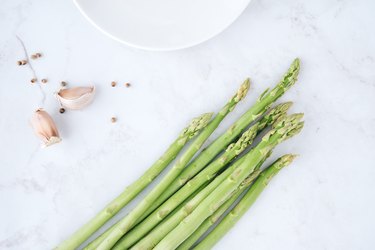
Consisting of oxygen, carbon dioxide and other substances, gas is air that moves through your digestive tract, allowing your body to release enzymes to digest food. While foods affect people differently, limiting or avoiding common dietary gas culprits and emphasizing alternative foods that don't cause gas can help minimize discomfort — like stomach or back pain caused by gas.
If your symptoms are severe or long-lasting, seek guidance from your doctor. Here, learn the foods you can eat to reduce and avoid gas.
Video of the Day
Video of the Day
Fruits and Vegetables That Don't Cause Gas
Fruits and vegetables are important components of a healthy diet. If you're prone to gassiness, however, you might want to limit your intake of cruciferous vegetables, such as cabbage, cauliflower and broccoli, and certain fruits, such as bananas and raisins, because they could worsen your symptoms. The University of Maryland Medical Center recommends that people with irritable bowel syndrome, a condition that typically causes gassiness, bloating and other symptoms in 10 to 20 percent of the population, limit these fruits and vegetables and emphasize less gaseous whole foods in their diet. Non-gassy vegetables and fruits, or at least those less likely to make you uncomfortable, include berries, cantaloupe, bell peppers, asparagus and avocado.
Whole-Grain Rice for Less Gas
Nearly all carbohydrates stimulate some amount of gas during digestion. But that doesn't mean you should avoid them, as they're your body's prime energy source. Consuming sufficient amounts of carbohydrates daily — 45 to 65 percent of your total calories, according to the Dietary Guidelines for Americans, 2015-2020 — is important. For the gassiest souls among you, rice is the safest carbohydrate because it's the only starchy food that does not produce gas as it's broken down. For the most nutritional benefits, choose whole-grain rice varieties such as brown and wild rice over instant and white rice. You can also swap out refined pastas in your diet with brown rice noodles.
Yogurt and Dairy Alternatives
Lactose intolerance becomes more common in adulthood, according to the National Digestive Diseases Information Clearinghouse, and is particularly common in non-Caucasian individuals. If you're intolerant to lactose, this naturally occurring sugar in cow's milk dairy products can cause or worsen gassiness or other symptoms of intestinal distress and general discomfort. Nondairy milks, such as almond, soy and rice "milks," provide useful alternatives. Because yogurt contains healthy, beneficial strains of bacteria called probiotics, it's possible that this dairy food won't cause similar gas symptoms. Probiotic supplements may also help relieve gassiness and other symptoms of IBS, although you should always let your doctor know what sort of supplements you take.
Lean Proteins May Help Reduce Gas
Fat in your diet doesn't cause gas, but it can increase bloating and gas pains by delaying stomach emptying. The NDDIC recommends limiting fatty foods and emphasizing lean protein sources as a tactic for reducing your gassiness, because while fatty meats may cause gas, protein on its own doesn't stimulate gas during digestion. Instead of fatty steaks, pastries or fried appetizers, choose leaner alternatives such as baked or broiled fish, skinless white-meat chicken kabobs or sautéed tofu. Other lean protein sources you can snack on include edamame (steamed soybean pods) instead of nachos; or you can keep fat levels down by seasoning protein-rich entrees with herbs and spices instead of heavy sauces or butter.
- National Digestive Diseases Information Clearinghouse; Gas in the Digestive Tract
- University of Maryland Medical Center: Irritable Bowel Syndrome
- Health.gov: Dietary Guidelines for Americans, 2015-2020
- National Digestive Diseases Information Clearinghouse: Lactose Intolerance
- University of Michigan Health System; Helpful Hints for Controlling Gas (flatus)
- Academy of Nutrition and Dietetics: Yogurt Mania: Low-fat, Greek or Organic: An Explosion of Culture
Is this an emergency? If you are experiencing serious medical symptoms, please see the National Library of Medicine’s list of signs you need emergency medical attention or call 911.